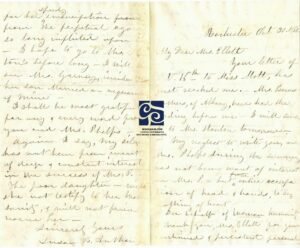
SUSAN B. ANTHONY
DETAILS A PIVOTAL MOTIVATING EVENT IN HER EARLY LIFE AND CAREER
“I HAVE NEVER HAD A MISGIVING AS TO THE RIGHTFULNESS OF AIDING MRS. P[HELPS] TO PERSONAL FREEDOM – AND ONLY HAVE TO REGRET THAT IT HAS BEEN SO VERY LITTLE AID AND COMFORT IN MY POWER TO RENDER.”
IN THIS FABULOUS LETTER, SHE RECALLS A DOCTOR WHO HAD HIS WIFE COMMITTED TO AN INSANE ASYLUM, BECAUSE SHE HAD DISCOVERED HIS INFIDALITY, AND FURTHER RELATES HER ASSISTANCE IN HIDING THE WOMAN, AND THE AFTERMATH WITH THE KIDNAPPING BY HIM OF THEIR CHILDREN OFF THE STREETS IN BOSTON.
ANTHONY, SUSAN B. (1820-1906). American woman-suffrage advocate. Scarce, early, and Important Autograph Letter Signed, “Susan B. Anthony”. Four very full pages, octavo. Rochester, N.Y., October 30, 1861. Fine condition. To “Mrs Ellett”. Anthony writes:
“My Dear Mrs. Ellett, Your letter of Oct 16th to Miss Mott, has just reached me. Mrs. Barnes and others, of Albany, have had the reading before me – I will send it to Mrs. Stanton tomorrow –
My neglect to write you, and Mrs. Phelps during the summer, has not been want of interest in Mrs. P. – but from entire occupation of head and hands, to say nothing of heart. On behalf of woman humanity I thank you, Mrs. Ellett for your continued and persistent personal attention to Mrs. P. – I saw the news paper paragraph of Boston gossip – the Harris family must be in terrible rage – to have this culmination of their united wrong to one of their members – I hope that which has been whispered in secret will now be proclaimed upon the house tops.
I have never had a misgiving as to the rightfulness of aiding Mrs. P. to personal freedom – And only have to regret that it has been so very little aid and comfort in my power to render.
She knew the man she had to deal with – I could never have believed he would be so base as to kidnap her in the way he attempted. We read of such feats in romances – but what sane man would attempt it in broad daylight in the streets of Boston – he must be in desperate fear of exposure to the public – All the fates help to bring the full glare of actual facts upon him. I hope no amount of money can buy the quietness of Ms. P. – they will leave no hope of smothering the whole thing unfollowed [sic].
I have never met either of the Harris’ to exchange a word since my first talk – Were I in Albany I would surely call on Hamilton and his wife. Convey to Mrs. Phelps my most earnest sympathy and strongest hope for her speedy emancipation fron From the perpetual agony so long inflicted upon her. I hope to go to Mrs. Hantons [?] before long – I will see Mrs. Garnsey, incidentally her son married an acquaintance of mine.
I shall be most grateful for any and every word from you and Mrs. Phelps – Again I say, my silence has not been from want of deep and constant interest in the success of Mrs. P. The poor daughter – will she not testify to her mother’s sanity, and will not friends rescue her – Sincerely yours, Susan B. Anthony.”
Susan B. Anthony, joined with other Suffrage and Abolitionists such as Miss Lucretia Mott and Elizabeth Cady Stanton, who fought vigorously for the rights of women and for the abolition of slavery. Her campaign for woman suffrage began in earnest in 1852 when she attended her first woman’s rights convention. By 1854 she circulated petitions for married women’s property rights. Thus the practical nature of Anthony’s work was evident during her interactions with Mrs. Elizabeth Phelps, a Bostonian woman who had sought her help, as our letter illustrates and on which we elaborate.
Mrs. Phelps had married the respected Dr. Charles Abner Phelps, a Senator representing Massachusetts. He found his reputation seriously threatened following his wife’s discovery of his marital infidelities and in response, Dr. Phelps committed her to an insane asylum under claims that she was delusional.
Under such constraints, Mrs. Phelps was unable to see her three children for a year and a half. Her husband’s brother (a lawyer from New York) later convinced Dr. Phelps to allow her a limited visit. Mrs. Phelps had in the interim sought help from Anthony. It was during that visitation that Anthony used the means of the under-ground railroad to help Mrs. Phelps flee to New York City, accompanied by her thirteen year old daughter.
Anthony’s active involvement in the situation brought unwelcome responses from those who claimed that she threatened abolition and women’s rights activism through the association of aiding and hiding Mrs Phelps. William Lloyd Garrison questioned her knowledge of Massachusetts law, pointing out that a father had complete control over his children. However, she held her ground and refused to reveal the hiding place of Mrs. Phelps and her daughter. Eventually, (as noted in our letter) Mr. Phelps located his daughter, kidnapping her while on her way to Sunday school. Mrs. Phelps was later able to obtain a divorce with the help of her friends.
The events detailed and alluded to in our letter were a pivotal event in the life of Susan B. Anthony. For more on this event, we recommend seeing: https://inmatesofwillard.com/2012/10/19/1860-susan-b-anthony/ . In our experience, spanning the last 6 decades, it would be exceedingly difficult to find a better letter on this topic/event. Thus, acquisition of this letter would certainly represent a high spot in any collection focused on the Woman’s Suffrage Movement or Susan B. Anthony.
$16,500.00